Exam 14: Game Theory and Strategic Behavior
Exam 1: Analyzing Economic Problems79 Questions
Exam 2: Demand and Supply Analysis104 Questions
Exam 3: Consumer Preferences and the Concept of Utility88 Questions
Exam 4: Consumer Choice83 Questions
Exam 5: The Theory of Demand94 Questions
Exam 6: Inputs and Production Functions108 Questions
Exam 7: Costs and Cost Minimization84 Questions
Exam 8: Cost Curves91 Questions
Exam 9: Perfectly Competitive Markets86 Questions
Exam 10: Competitive Markets: Applications86 Questions
Exam 11: Monopoly and Monopsony83 Questions
Exam 12: Capturing Surplus79 Questions
Exam 13: Market Structure and Competition70 Questions
Exam 14: Game Theory and Strategic Behavior69 Questions
Exam 15: Risk and Information71 Questions
Exam 16: General Equilibrium Theory69 Questions
Exam 17: Externalities and Public Goods68 Questions
Select questions type
A strategy in which you do to your opponent in this period what your opponent did to you in the last period is a:
(Multiple Choice)
4.8/5  (28)
(28)
In the following games, all payoffs are listed with the row player's payoffs first and the column player's payoffs second (36-40). 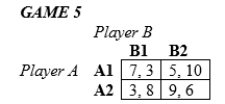 -In Game 5 above, in the Nash equilibrium in mixed strategies
-In Game 5 above, in the Nash equilibrium in mixed strategies
(Multiple Choice)
4.8/5  (35)
(35)
In the following games, all payoffs are listed with the row player's payoffs first and the column player's payoffs second (36-40). 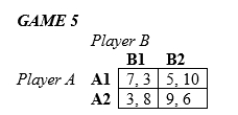 -In Game 5 above, if the players move sequentially with Player B choosing first, the Nash equilibrium will be
-In Game 5 above, if the players move sequentially with Player B choosing first, the Nash equilibrium will be
(Multiple Choice)
4.8/5  (33)
(33)
The likelihood of a cooperative outcome in a repeated prisoners' dilemma type game increases when:
(Multiple Choice)
4.9/5  (26)
(26)
In the following games, all payoffs are listed with the row player's payoffs first and the column player's payoffs second (36-40). 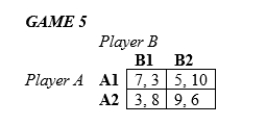 -In Game 5 above,
-In Game 5 above,
(Multiple Choice)
4.8/5  (35)
(35)
In the following games, all payoffs are listed with the row player's payoffs first and the column player's payoffs second. 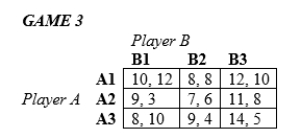 -In Game 3 above,
-In Game 3 above,
(Multiple Choice)
4.9/5  (40)
(40)
In the following games, all payoffs are listed with the row player's payoffs first and the column player's payoffs second. 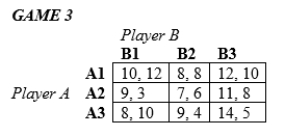 -In Game 3 above,
-In Game 3 above,
(Multiple Choice)
4.9/5  (35)
(35)
Showing 61 - 69 of 69
Filters
- Essay(0)
- Multiple Choice(0)
- Short Answer(0)
- True False(0)
- Matching(0)